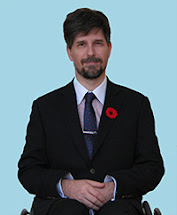By Nic Steenhout, Disability rights advocate and the former Director of Vivre dans la Dignité
 |
| Nic Steenhout |
It is hitting me particularly hard because less than 10 years ago, I was saying that if Québec, and then Canada, legalized euthanasia, it wouldn't take long before people with disabilities no worse than my own, that were not at end of life, would be able to apply for and be granted euthanasia.
I really hate to say "I told you so". I hate even more that I was right.
The government said at the time: "there's not going to be a slippery slope". They lied. They called me alarmist. As it turns out, I was not exaggerating the dangers.
On April 13, 2022, CTV was reporting the story of a 51 year old woman which multiple chemical sensitivity (MCS) who could not find housing. She applied for and was given medical aid in dying.
On April 30, 2022, CTV again reports the story of a disabled woman who could not find housing and applied for euthanasia. This time, the woman is 31, also with MCS, and a wheelchair user. She hasn't yet been killed.
These two women were not given the options to live. Finding wheelchair accessible housing is next to impossible to start with. Finding affordable wheelchair accessible housing is even more difficult. Throw in the need to be protected from chemical exposures, and it becomes really thorny. So thorny that people search for years before being able to find, and opt for death instead.
What are we doing to disabled people? The governmental disability benefits are laughable. Who can find housing, let alone paying all other life necessities, including food, on $1,000 or so a month? The amounts of disability benefits haven't increased in a very long time in Canada. It's almost as if disabled people don't count. It's cheaper to provide euthanasia than support disabled citizens appropriately.
It gets even more interesting when we see that the government was able to unlock funds to help workers through being out of work during the pandemic's early days. The message from our government is very clear. Disabled people don't count.
I haven't been active in the fight against euthanasia (regardless of the name we give it) for the last several years because these public stories, and some very personal ones, just ate at me. It is ironic that as an opponent to euthanasia, I had two family members and a close friend apply for it, and die from it.
My grand mother, in Belgium, died from euthanasia. She was 98 years old. She had some vision issues, and needed a walker to move around. She was most certainly not at imminent risk of dying. But she was incredibly lonely with her family across an ocean.
My aunt, in Québec, was 77 years old. She had Multiple Sclerosis. She'd had a lung removed because of lung cancer, but she'd been in remission for years.
My friend John was in his early 60's. He had cancer. But he was well away from imminent death. He was grocery shopping and preparing meals for the freezer for his spouse the day before his euthanasia.
These three people did not meet the so-called safeguards that the pro-euthanasia crowd said would protect vulnerable people. So even with safeguards in place, there are people dying from euthanasia that shouldn't be. And now... Now we just keep expanding the eligibility criteria.
Where does it stop? When do we decide that supporting disabled people is the right investment in our society, rather than allowing them to die? When do we stop funding suicide prevention programs? Because it's not that far of a stretch to see this happen.
10 years ago I was saying that people with disabilities no worse than my own would soon have access to medical aid in dying. I was right. Please don't let me be right about the elimination of funding for suicide prevention programs. Please.
If you're reading this, it's likely that you already have strong feelings about euthanasia. You're probably outraged by these recent news stories. It's been said before, but we all need to talk to our elected representatives. Personal notes, phone calls, even emails. Let's let them know this is not ok. Let them know that enough is enough. The horse has bolted, we can't close the barn doors. But we can try and fence it in. We can try and limit further erosion.























